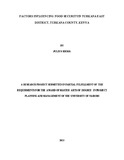| dc.description.abstract | The purpose of the study was to assess the factors influencing Food security in Turkana East ,
Turkana County, with reference to Food for Assets programme. This research was guided by the
objectives; to establish the influence of bad weather/climatic conditions on household’s food
security, to determine the effect of insecurity on food security, to assess the effect of cultural
practices on food security, to establish the impact of Government policies on agriculture on food
security in Turkana East District.
The study targeted 452 households receiving food aid, 4 staffs of the lead Cooperating partner
distributing relief food in Turkana East District and 6 government officers from the different line
ministries helping in the implementation of the project (Actionaid, 2012). Simple random
sampling was used in the study. The information for the study was gathered by use of
questionnaires as the main research instruments and interview schedules. The questionnaires
were subjected to the head of households, while a key informant questionnaire was administered
to the staffs of the Lead Cooperating partner distributing relief food aid and government officers
from the different line ministries helping in the implementation of the project. A research
instrument is valid depending on how the data collected is related in terms of how effective the
items have sampled significant aspects of the purpose of the study (Orodho, 2005). The collected
raw data was coded and analyzed by both descriptive and inferential methods using Statistical
Package for Social Scientist (SPSS) software. This study revealed that bad weather/ climatic
conditions affect food security negatively. The correlation coefficient between bad
weather/climate and food security is -0.75 and P- value = 0.075. This shows that there is a strong
negative correlation between bad weather/climate and food security. Secondly, the study
established that the major form of insecurity in the area is cattle raids which are very persistent in
the region. Thirdly, the study established that majority of the respondents (63%) were
polygamous while 33% had monogamous families. This culture of having many wives leads to
the families having many children. Finally, the study established that 86% of the respondent
cultivated less than 2 acres of land and did not use modern farming technique and had poor
storage facilities for their produce. This is an indication of insufficient food production. Also the
correlation coefficient between agricultural practices and food security is +0.78 and P- value =
0.075. This shows that there is a strong positive correlation between agricultural practices and
food security. | en_US |

